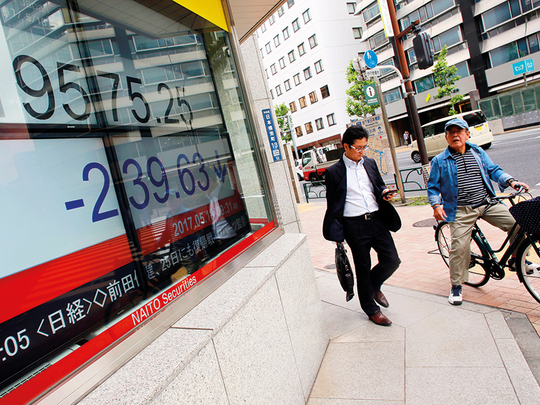
Tokyo: Some were quick to put in sell orders on Asian stocks this week as the latest political convulsions in Washington hurt appetite for riskier assets globally. Add in rumblings from Brazil, and all of a sudden emerging markets don’t sound so appealing any more.
Not so fast, some analysts are saying. The Korean won, for one, has been hit by risk-off waves before — such as the April Syria attack — only to bounce back handsomely. Asia benefits from the world’s fastest economic growth, and may be poised to weather the latest international political worries from outside the region as well.
What’s hurt Asian assets most in recent years has been the risk of more aggressive US monetary tightening and worries about a hard landing in China, along with lack of clarity over Chinese policy shifts. For now, China concerns are limited thanks to what policymakers there signal is a measured campaign to contain leverage. As for the Federal Reserve, there’s little indication it’s about to step up interest-rate hikes after a softer run of economic data.
“This could be a great buying opportunity across Asia, where earnings have been strong, trade is picking up and China is doing well,” said Nader Naeimi, head of a dynamic investment fund at AMP Capital Investors in Sydney. “If markets fall further, we will be looking to get back in slowly.” Appetite for risk
The MSCI Index of Asia Pacific stocks excluding Japan dropped more than half a per cent for a second day Thursday as appetite for risk was impaired by reports that President Donald Trump might have asked for an end to a probe into his former national security adviser. Asian currencies including the South Korean won, Indian rupee and Taiwan dollar also fell.
The recent run-up in Asian stocks means there may be further scope for a pullback, Naeimi said. Some sectors in particular might not be great buys — “technology is showing signs of euphoria,” he said. But it’s worth considering that emerging and developing Asian economies are poised to expand 6.4 per cent this year, compared with a global pace of 3.5 per cent and a rate of 2 per cent for advanced economies, according to the International Monetary Fund.
“Fundamentals in Asia are better than other emerging markets,” said Takahide Irimura, an economist in Tokyo at Mitsubishi UFJ Kokusai Asset Management Co, which oversees the equivalent of about $114 billion (Dh418 billion). That may help explain why “Asia seems to be less hit by the risk-aversion and sell-offs this time,” he said.
Inflation rates
One proviso for fixed-income investors is that Asian bonds have lower yields than others, thanks in part to contained inflation rates in most of the region. For Irimura, that leaves higher-yielding markets such as India and Indonesia as “probably the most attractive.”
A softer US dollar poses a risk to Asian growth, however, in the form of less competitive exchange rates. Even so, a recent upturn in global trade offers some tailwinds to the region. And it gives Chinese policymakers further space to focus on domestic reforms without the overhanging danger of escalating capital outflow pressures.
“At the end of the day, the Asian fundamental story is very strong and China is the biggest driver,” Naeimi said.












